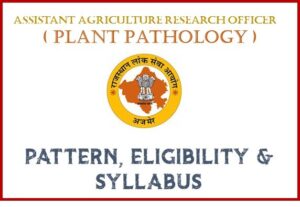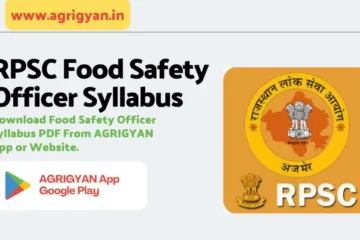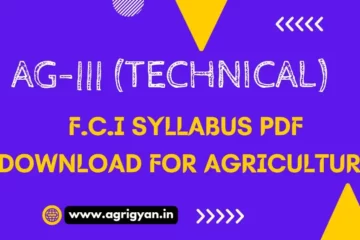Assistant Agriculture Research Officer (Plant Pathology) : Pattern, Eligibility & Syllabus
Exam Pattern :-
| 1. | Maximum Marks | 100 |
|---|---|---|
| 2. | Number of question | 100 |
| 3. | Duration of paper | 2 Hr |
Eligibility :-
| Assistant Agriculture Research Officer (Plant Pathology) |
Candidate Having IInd Class M.Sc. (Ag.) in Plant Pathology or IInd Class M.Sc.(Botany) with specialization in Plant Pathology. |
Syllabus of AARO:-
1. History and Scope of Plant Pathology :-
- History of plant pathology with particular reference to India. Major epidemics and their social impacts. Historical developments of
chemicals, legislative, cultural and biological protection measures. Scope and application of microbes in agriculture industry, pollution and biological control of pests.
2. Mycology, Plant virology, and Plant Bacteriology:-
- Mycology: Introduction, terms and basic concepts. General Characters of fungi, types of fungal thalli, fungal tissues, modifications of thallus, reproduction in fungi (asexual and sexual). Classification of fungi. Comparative morphology, ultra structure, characters of different groups of fungi up to generic level. Importance of fungi. Mycorrhizal associations.
- Plant virology: History of plant viruses, composition and structure of viruses. Symptomatology of important pant viral diseases, transmission, Chemical and physical properties of viruses, host virus interaction, virus vector relationship. Classification, replication and movement of viruses. Isolation and purification of viruses. Mycoviruses, arbo- and baculoviruses, satellite viruses, satellite RNAs,
viroids and prions. - Plant Bacteriology: Introduction to morphology, ultrastructure and chemical composition of phytopathogenic procarya viz. MLO/phytoplasma, spiroplasma and other fastidious procarya. Importance of phytopathogenic bacteria.
Classification and nomenclature of phytopathogenic procarya. Important diseases caused by phytopathogenic procarya . Growth and nutrition of bacteria. Reproduction in prokaryotes. . General biology of bacteriophage, L-form bacteria and plasmids.
3. Plant Disease management:-
- Principles of plant disease management by cultural, physical, biological, chemical methods of plant disease control, integrated control
measures of plant diseases. Quarantine, exotic pathogens and pathogens introduced into India. Genetic basis of disease resistance and pathogenicity, gene for gene hypothesis, breeding for disease resistance. Seed certification. Chemical nature and classification of
fungicides and antibiotics. Method of application of fungicides. Spraying and dusting equipments, their care and maintenances.
| 1. | IBPS SO Agriculture Syllabus | Click here |
|---|---|---|
| 2. | IBPS AFO( Agriculture Field Officer ) | Click here |
| 3. | Agriculture Optional Syllabus For UPSC | Click here |
4. Diseases of Crop Plants:-
- Major Fungal, bacterial, viral, viroids, phytoplasmal and nematode diseases of cereals, millets, oilseeds, pulses, fruits, vegetables, plantation, fiber, spices and ornamental crops with special reference to etiology, disease cycle/transmission and integrated management. Post harvest diseases in transit and storage and management. Phanerogamic parasites and Non-parasitic Diseases of crop plants and their management.
5. Principles of Plant Pathology :-
- Plant disease concepts, biotic and abiotic causes of plant diseases. Survival and dispersal of important plant pathogens, role of environment and host nutrition on disease development. Host parasitic interaction, infection process, disease development: role of enzymes, toxins, growth regulators. Defense mechanisms. Altered plant metabolism as affected by plant pathogens. Genetics of resistance ‘R’ genes, mechanism of genetic variation in pathogen, molecular basis for resistance and genetic engineering of disease resistance.
6. Laboratory and Analytical Techniques:-
- Preparation and sterilization of common media. Methods of isolation of pathogens and their identification. Preservation of
microorganisms in pure culture. Methods of inoculation. Measurement of plant disease. Molecular detection of pathogens in seeds and other planting materials. Laboratory equipment and their use: autoclave, hot air oven, laminar flow, spectrophotometer, electrophoresis, light and electron microscopy, incubator, ultracentrifuge.
7. Epidemiology and forecasting of plant disease :-
- Concepts in epidemiology. Development of disease in plant population. Monocyclic and polycyclic pathogens. Role of environment and meteorological factors in the development of plant disease epidemics. Survey, surveillance (including through remote sensing), and prediction and forecasting of diseases. Epidemic analysis and prediction models. Crop loss assessment.
8. Mushroom production Technology :-
- Mushroom cultivation, food, medicinal value, uses of mushroom, edible and poisonous mushrooms. Life cycle of cultivated mushrooms, maintenance of pure culture, preparation of spawn and facilities required for establishing commercial spawn lab.




